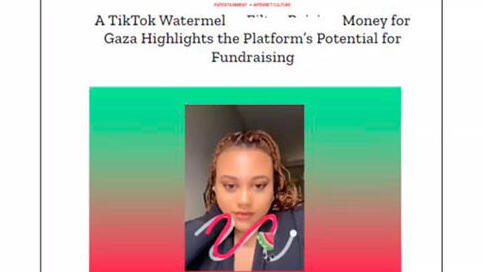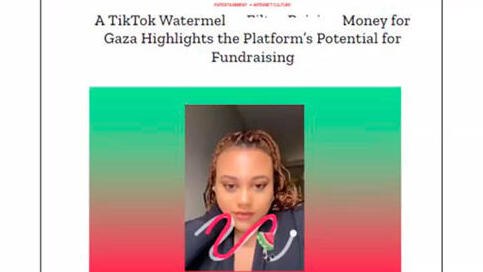
ISRAEL AT WAR
Terror crowdfunding: "Terrorist organizations have raised tens of millions since the start of the war"
According to a senior official at the Ministry of Defense, Hamas, Islamic Jihad and the like have been running crowdfunding campaigns under the guise of donating to humanitarian organizations and refugees in Gaza
"There is no ceasefire in the financing of terrorism, and crowd-funded campaigns to support terrorism under the guise of donating to humanitarian organizations and refugees in Gaza," said the head of the operational countermeasures department at the National Bureau for Counter Terror Financing (NBCTF) of Israel in the Ministry of Defense. He was speaking in a webinar held on the fight against terror financing in the current war against Hamas. According to him: "Tens of millions of dollars were raised in this way by Hamas, the Islamic Jihad and their ilk since the beginning of the war."
"This crowdfunding campaign is fast and accessible and it's easy to get it going on social networks," the official added in the discussion that dealt with various methods developed by terrorist organizations to bypass the global banking and financial system, which is under constant surveillance and supervision by anti-money laundering authorities around the world.
"It is very difficult to incriminate these campaigns, and to prove that it is money that goes to terrorism and not medicine," says the official. "When we identify a campaign, it will be examined to see if it is possible to unravel it and understand who is behind it, to find out if it is a non-profit organization or an organization that has been declared internationally as supporting terrorism, and then we can try to incriminate it and stop the transfer of funds."
In the online discussion, Gil Bareket, Head of Strategy Analytics & Intelligence at the Money Laundering and Terror Financing Prohibition Authority, presented examples. Under the keywords "with Gaza", according to a presentation by Bareket, about 97 campaigns were located in which 204,500 people sent funds, raising a total of $17,851,569. The common denominator for all of them is that they claim that the funds are intended for "humanitarian needs of the Palestinians in Gaza".
The examination of the campaigns is done behind the scenes with the help of the Israeli intelligence agencies - the Shin Bet, Aman (military-intelligence branch of the IDF) and Mossad - with the help of foreign bodies. "We check where the money goes, who the organization is, where it operates, what means of payment it offers and more," he said. "Campaigns that we were able to incriminate, when we found out that there was a fund with ties to Hamas, we worked to block it. The Israel Defense Forces or the Israel Police, for example, turn to enforcement bodies in the world on the basis of treaties and cooperation to block them. Since the beginning of the war, we have blocked dozens of means used to transfer money - rechargeable cards, bank accounts or digital wallets."
Another method to block campaigns is by publicly exposing them. "We are constantly updating our website with more and more campaigns that we identify and criminalize," he said. "The goal is that financial entities in the world that receive the information from us - and this is actually what they are looking for - will shut them down. We also reveal the service or country that hosts the campaign, so that there is a clear blacklist and they will be taken down."
"There is an increase in crowdfunding because the war is covered all over the world and this brings exposure and more people's desire to donate, and they increased donations that way," said Dan, an expert in counter-terrorism from a security body whose full name, as well as the body he works for, has not been revealed.
Hawala - a fund transfer practice from ancient times
Another method of financing terrorism that is currently flourishing in the war is the traditional channel called Hawala. This is a method often used by foreign workers around the world who want to transfer money to their families, without the need to transfer the funds through official and supervised banks or financial institutions. This is essentially a trust method, in which a money exchanger in country A asks a money exchanger in country B to pay on behalf of a family member, when in the future the exchangers offset each other.
"There are a lot of foreign workers - Syrians, Palestinians, Lebanese - who work in the Western world and work according to the Hawala system," says Dan. "They want to transfer the money to the family. And this is where the Hawala comes in. Innocent workers who earned money, transferred it through an offsetting mechanism. The Hawala is used in many places in the world and is not supervised. It's literally going back in time in banking."
Dan gives an example of a case that was exposed. "Syrian workers wanted to transfer money to their families in Syria. The Syrian government took the dollars that were intended for the families, and gave the families Syrian pounds instead. That way it has dollars it can use for terrorism."
"Only dollars in 'Al-Qard Al-Hasan'"
The discussion also highlighted terrorist organization Hezbollah in Lebanon. "You need to understand the extent of the risk and its multiples in relation to the Hezbollah budget," Dan said. "Hezbollah's budget is a billion dollars a year. They want it to be $5 billion and that will mean there will be more operatives and more missiles and that's why we are so focused on reducing this budget."
According to Dan, despite the many money transfers and the relatively new technological methods being used such as crypto and digital wallets, ultimately cash is king. The U.S. dollar is the currency that everyone wants to use.
"Iran, which transfers funds in cash, is the biggest terror financier," says Dan. "Whether it's Hamas or Hezbollah, GAP and the various militias such as the Houthis in Yemen. They are funded in dollars. It's just the currency they want. And in order to give them dollars, it's a whole mechanism of exchangers that supports it."
The cash mechanisms using exchangers and non-banking organizations have a significant impact on the economy, according to Dan. "The result is that Iran simply destroys countries economically from the inside, and destroys the entire banking system. In countries like Lebanon, they establish a type of financial shadow bodies. A Hezbollah operative, for example, enters "Al-Qard Al-Hassan" (an alleged charitable institution that provides credit to the Shia community and receives dollars from Iran), and for him it's a bank in the full sense of the word.
"It also turns out that entire populations depend on terrorism for their livelihood," Dan concluded. "Those who are active in Hezbollah, for example, from the age of 20 to 40, and end up leaving will not suddenly become lawyers. It is an entire industry and when there is a large population that lives and makes a living from terrorism, it is difficult to change. Therefore, the more the crises seem to deepen in Lebanon and Gaza, the easier it will be for Hezbollah and Hamas to recruit activists."
According to Bareket, the terrorist organizations also found a way to raise funds through incentive programs for social media users. For example, he presented a recruitment campaign using TikTok. A young woman invited users to download a watermelon-colored filter, apparently because they are similar to the colors of the Palestinian flags. According to TikTok's reward policy, for every use of the filter above the threshold of 200,000 users, the campaigner receives payment. The filter was downloaded 6.5 million times, and thus the woman raised $14,000 - the maximum amount in the program. Its revenues, she wrote, are intended to support organizations operating in Gaza.














